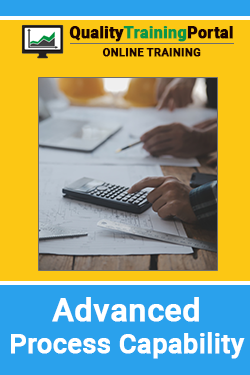Course Information
Advanced Process Capability Training
Learners will be able to:
- Conduct a process capability study using the best approach for the given process.
- Address complications that often happen with process capability studies.
- Use the process capability study improve the process and reduce its inherent variation.

About This Course
Process Capability Study is a tool used to determine if a stable process is capable of meeting a customer’s specification. Process capability is based on statistical techniques that are used to predict the complete output of a process based on a relatively small sample. There are different ways to measure process capability including the capability ratio, capability index and the Cpk. The Cpk is the most commonly used measure of process capability because it not only determines if the process is capable is meeting the spec, but it also predicts how well the process is centered on the nominal of the specification.
This course covers how to conduct a process capability study, take action to improve capability and deal with complications in interpreting and analyzing capability measures.
- A good understanding of statistical measures of variation including standard deviation.
- Ability to calculate capability ratio, capability index and Cpk.
- Successful completion of Basic SPC or the equivalent.
- English (EN-US)
- Chinese (simplified) (ZH)
- Czech (CS)
- French (FR)
- German (DE)
- Italian (IT)
- Japanese (no audio) (JA)
- Korean (no audio) (KO)
- Polish (PL)
- Portuguese (Brazilian) (PT-BR)
- Romanian RO)
- Russian (RU)
- Spanish (ES)
- Vietnamese (no audio) (VI)
Course Objectives
- Prepare for and conduct a process capability study.
- Use the results of a process capability study to improve the capability of the process.
- Learn what to do if the process capability cannot be improved enough to meet the customer’s requirements.
- Know the differences between Ppk & Cpk.
- Know how to handle process capability study complications and challenges.
- Explain what Six Sigma Quality means.
- Be able to use Z-values.
Course Outline
Lesson 1 | Conducting a Process Capability Study
- How-to conduct a process capability study.
Lesson 2 | Taking Action to Improve the Process
- What to do if the process is not capable.
Lesson 3 | More Capability Indices
- Pp and Ppk
- Differences between Ppk and Cpk.
- Cpm and Ppm
Lesson 4 | Process Capability Study Complications
- Using individuals instead of subgroups
- Compensating for tool wear
- Skewed distributions
- One-sided specs
- Short Run processes
Lesson 5 | Six Sigma Capability
- What is meant by Six Sigma Quality.
- How to use Z-values.
Challenge
- An assessment of the learner’s progress in this course.

4.6 out of 5 stars
Comments from Learners About This Course
- Very good explanations and examples.
- This course was very well written with great examples to work with.
- Thorough explanations and ample examples!!
- Excellent training on process capability studies.
- Excellent course with good flow of content.
You may also be interested in…
- DOE: Screening Experiments – Comprehensive training in one of the most powerful families of Designs of Experiments – Screening Experiments. Includes training in both Plackett-Burman designs and Taguchi techniques.
- Advanced Control Charts – Step-by-step training in how to set up a variety of different control charts as well as how to determine the best chart to use is given situations.
- Mistake-Proofing Training – Comprehensive online training in poka yoke/mistake-proofing techniques for manufacturing operations.





